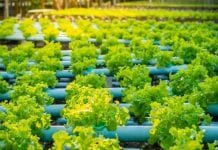
Government Europa speaks to the Director of Public Affairs at the ECPA, Graeme Taylor, about how advanced technology can power crop protection and bolster food security and sustainability for citizens in Europe and beyond.
As the worldwide population expands, we are seeing an increasing strain on our food sources. As a result, agricultural industries are turning towards advancing technologies, such as robotics and AI, to produce higher yields of food by significantly bolstering the workforce and efficiency of farms. From fruit picking robots to driverless tractors and pesticide sprayers, advanced technology is transforming the agriculture industry.
The European Crop Protection Association (ECPA) is the association which represents Europe’s crop protection industry. ECPA members are responsible for developing innovative and science-based solutions which work to ensure that crops are healthy, contributing to safe, affordable, healthy and sustainable food supplies for European citizens. The ECPA aims to:
- Encourage sustainable farming through the responsible use of crop protection technologies, which are integral to the sustainable intensification of agriculture, and as a result, food security; and
- Promote the belief that policy should be informed by science, whilst being designed to mitigate risk, amongst other objectives.
Government Europa spoke to the Director of Public Affairs of ECPA, Graeme Taylor, about how advanced technology can assist in bolstering the strength of food security and sustainability for citizens in Europe and beyond.
As the population continues to increase, how can we address the issue of food security?
Food security is one of the biggest challenges that we face as a society; a population of ten billion people by 2050 is a significant challenge and it’s a challenge that the crop protection industry can, and is, playing a significant role in addressing. The European Crop Protection Association represents 23 companies – seven major multi-national companies and a number of SMEs, which are all involved in the manufacture of pesticides across Europe.
In terms of producing enough food, if we look at the ability of suitable pesticides applied in the correct way, at the correct moment and the correct crop, yields which farmers are able to be achieve can be increased significantly. Contrary to what many would believe, pesticides can have a significant beneficial impact for the environment (reduced use of water and CO2 emissions), and for the economy. We have to remember that it’s not only about what we are producing here for a European population – food is a global issue – so we also need to consider what we can produce and send to other parts of the world where their access to food sources are limited. Access can be dependent upon a number of areas, including:
- Difficulties in growth, owing to the conditions of that country; or
- Lack of access to innovation for agriculture, amongst other factors.
These are the main ways in which we, as an industry, are helping to support and ensure food security in the future.
Do you believe that AI and robotic farming are going to optimise the yields of food products from agriculture?
The potential in technology to contribute to addressing some of the major challenges we face in agriculture is incredibly exciting. Digital and precision farming can enable farmers to be more targeted in terms of how they address pests, identifying what diseases impact their crops, and allows farmers to use a smaller volume of pesticides by being more precise with the way in which pesticides are sprayed.
I’ve been on farms recently and it’s incredibly impressive in the way that farmers are harnessing innovation through the use of, for example, drones which can pinpoint exact locations on the field where they are having problems. As a result, they are able to treat these areas very specifically. Our companies are very interested in this area and are investing as a result. Advanced technologies are certainly one of the key ways that we’re going to be able to produce more with less in the future.
How can we strike a balance between producing high yields of food, but then also ensuring that we’re not harming the environment?
One of the biggest challenges when we talk about the way that we produce food now is that people see the use of pesticides as an activity which is harming the environment. It may seem counterintuitive but if farmers are using the product correctly, then it’s possible to use them in a way which does not harm the environment.
For example, the substance glyphosate was at the centre of a huge debate last year, regarding whether it should be approved or not. By using that product, it means that – on an individual farm basis – farmers can reduce the contribution of CO2 emissions from agriculture by reducing the need for tillage. Ordinarily, when ploughing the soil farmers are releasing nitrogen into the air which ultimately leads to less healthy soils.
There are a lot of ways in which being able to use pesticides or crop protection products can actually support the environment, as well as supporting biodiversity. Europe is essentially a garden; there is very little land in Europe that isn’t managed in some kind of way and it is about ensuring that the right tools are being used at the right time and in the appropriate way.
What needs to be done at an EU level to ensure protection of the environment, and as a result food safety?
One of the biggest challenges we have is the transition away from policy and decisions around the use of innovation in agriculture being based on science and evidence. Instead, we are now moving towards decisions being based on politics and emotion. Understandably, a disconnect has developed between people and the way that their food is produced. We completely understand that consumers are not necessarily going to respond to chemicals being used in food production in a positive way, but that’s why it’s hugely important for us as an industry to take leading role in explaining:
- Why pesticides are used;
- What they are used for;
- What the benefits are;
- What kind of safety measures are in place to ensure they are used properly; and
- What kind of approval processes are in place to ensure the ones used are truly safe.
We are doing this in a number of ways, but in particular through our award-winning campaign #WithOrWithout. To find out more, and to join the debate, visit: www.ecpa.eu/with-or-without
The EU and national authorities also need to do a lot more to educate people about the food that they eat, the way it is produced and why it is safe. Arguably, Europe has the safest food in the world, but if consumers are to follow political debates they would be excused for thinking the opposite was the case. More needs to be done to bolster confidence in the food which we eat every day; we are living longer, healthier lives than ever before and that’s no coincidence.
What are the priorities for the ECPA in 2018?
We represent the interests of the members of our organisation and our role is to try to ensure that any legislation being developed, or implemented, allows our companies to invest, innovate and provide the solutions which enable Europe to thrive.
To do this we – and indeed industry – need to have clear, consistent and predictable regulation. Starting this year, one of the biggest things which we will be focusing on will be the review of the European approval systems for pesticides, Plant Protection Products. The challenge we face is trying to re-focus the debate around pesticides onto fact-based and science-based evidence, in order to address the politics and emotion which are currently fuelling these debates.
We want to have open and honest debates with policymakers, decision makers and with society, about what kind of model of food production people want to see, as well as the consequences of different possible models of production that are out there. It is an important discussion that isn’t really taking place at the moment; there is an incredibly polarising debate going on around crop protection, the way in which food is produced and the use of pesticides. Real solutions can only be found if all actors can find middle ground.
Our companies are investing billions every year in research and innovation, trying to find solutions for agriculture and we need to work together for the benefit of everyone – be it farmers, NGOs, or society – to ensure that we are providing the crop protection solutions, and ultimately, the food that people need.
Graeme Taylor
Director of Public Affairs
European Crop Protection Association
http://www.ecpa.eu/


















